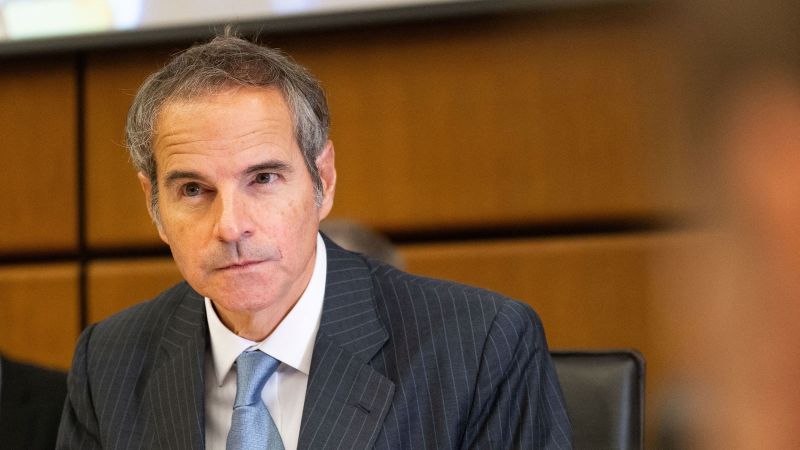Tensions in the Middle East remain high as the head of the UN’s nuclear watchdog, Rafael Grossi, states that Iran could restart enriching uranium in a matter of months. This announcement directly contradicts claims made by former President Donald Trump, who asserted that US strikes had significantly crippled Iran’s nuclear ambitions for decades. The implications of Iran potentially resuming uranium enrichment are far-reaching, affecting international relations, nuclear security, and regional stability.
This article breaks down the key statements from IAEA chief Rafael Grossi, the contrasting assessments from US intelligence, and the broader context of the Iran nuclear program. Understanding these nuances is crucial for grasping the complexities of the ongoing debate and the potential pathways forward.
IAEA Chief’s Assessment of Iran’s Nuclear Capabilities
Rafael Grossi, the Director General of the International Atomic Energy Agency (IAEA), has offered a sobering assessment of Iran’s nuclear capabilities following recent events. In an interview with CBS’s “Face the Nation,” Grossi stated that while the US strikes on Iran’s nuclear sites caused “severe damage,” they did not completely eliminate Iran’s capacity to enrich uranium.
Grossi emphasized that Iran retains the “industrial and technological capacities” to quickly resume its enrichment activities. He estimated that Tehran could have “a few cascades of centrifuges spinning and producing enriched uranium” in a matter of months. This assertion challenges the narrative that the US strikes had a lasting impact on Iran’s nuclear program.
He said:
It is clear that there has been severe damage, but it’s not total damage. Iran has the capacities there; industrial and technological capacities. So if they so wish, they will be able to start doing this again.
Grossi also highlighted the IAEA’s concerns regarding unanswered questions about Iran’s nuclear activities. He mentioned the discovery of uranium traces at undeclared facilities, raising concerns about the transparency and completeness of Iran’s disclosures to the agency.
Contradictory Claims and Intelligence Assessments
The IAEA chief’s assessment stands in stark contrast to claims made by former President Donald Trump, who asserted that the US strikes had “completely and totally obliterated” Tehran’s nuclear program. However, Grossi’s statements align more closely with an early assessment from the Pentagon’s Defense Intelligence Agency, which suggested that the strikes only set back Iran’s nuclear program by months.
The discrepancy between these claims underscores the difficulty in accurately assessing the impact of military actions on complex nuclear programs. While military strikes may inflict damage on physical infrastructure, they may not necessarily eliminate the underlying knowledge, expertise, and materials required to resume nuclear activities.
Following this week, Republican lawmakers acknowledged the US strikes may not have eliminated all of Iran’s nuclear materials – but argued that this was never part of the military’s mission.
Iran’s Response and International Oversight
In response to recent events, Iran has taken steps to reduce international oversight of its nuclear program. The Iranian parliament passed a bill halting cooperation with the UN nuclear watchdog, and Foreign Minister Abbas Araghchi suggested that the country could rethink its membership of the Non-Proliferation Treaty (NPT).
These actions raise concerns about the future of international monitoring and verification efforts in Iran. Reduced cooperation with the IAEA could make it more difficult to track Iran’s nuclear activities and ensure compliance with international obligations.
Grossi stressed the need for the IAEA to be granted access to Iran, to assess nuclear activities. He said Iran had been disclosing information to the agency up until recent Israeli and US strikes, but that “there were some things that they were not clarifying to us.”
Escalation of Regional Conflict
The recent conflict between Israel and Iran, which preceded the US strikes, highlights the escalating tensions in the region. Israel launched an attack it said aimed at preventing Tehran from developing a nuclear bomb, while Iran has maintained that its nuclear program is for peaceful purposes.
The exchange of attacks and the ongoing debate over Iran’s nuclear intentions contribute to a climate of instability and uncertainty in the Middle East. A breakdown in diplomacy and further escalation of military actions could have far-reaching consequences for regional and global security.
Implications and Future Outlook
The IAEA chief’s assessment and Iran’s recent actions have significant implications for the future of the Iran nuclear issue. The possibility of Iran resuming uranium enrichment in a matter of months raises concerns about the potential for further proliferation and the erosion of international norms.
It is essential for the international community to address these challenges through diplomacy, verification, and cooperation. A renewed commitment to the Iran nuclear deal, coupled with enhanced monitoring and verification measures, could provide a pathway towards ensuring the peaceful nature of Iran’s nuclear program.
Conclusion
The recent statements by IAEA chief Rafael Grossi paint a concerning picture of Iran’s nuclear capabilities, suggesting that the country could quickly resume enriching uranium despite recent setbacks. These developments underscore the urgent need for renewed diplomatic efforts and enhanced international oversight to prevent further escalation and ensure regional stability.
As the situation continues to unfold, it is crucial for policymakers, analysts, and the public to remain informed and engaged in the ongoing debate. The future of the Iran nuclear issue will have far-reaching consequences for global security and the non-proliferation regime.

Leave a Reply